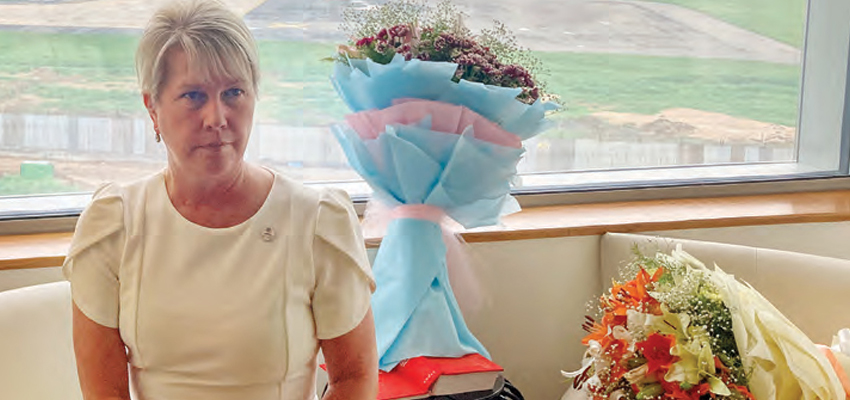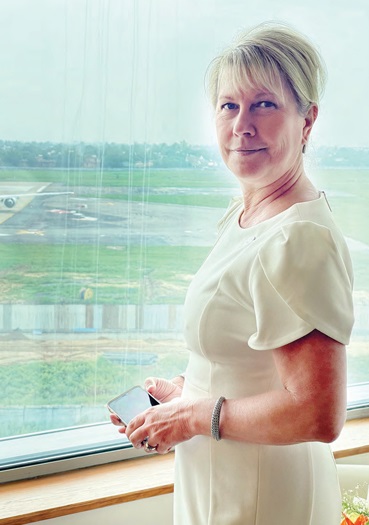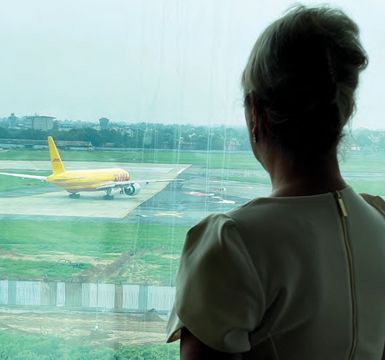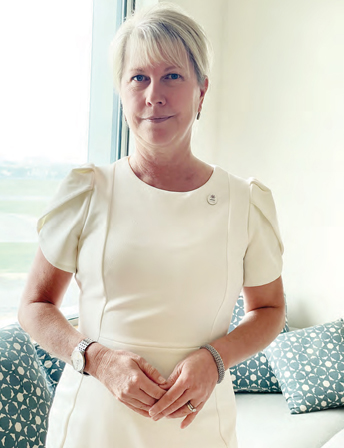Taking Care of the World

A member of the Rotary Club of Windsor-Roseland, Ontario, Canada, Jennifer Jones has taken over the reins of Rotary International as its President for 2022-23. She is the Founder and President of Media Street Productions Inc., a 25-year-old, award-winning media company in Windsor, Ontario and has many honours and recognitions. Known to be a leader in cultivating experiential fundraising opportunities, Jennifer has led the innovative #RotaryResponds virtual event in May 2020, which raised money for Covid-19 relief projects and showcased how Rotary members were responding to the pandemic around the world. She talks to Corporate Citizen about her experiences and journey so far.
"When the pandemic hit, when the world stepped down, Rotary stepped up. Even though our members were, just as everyone else in the world, contained to their homes, isolated, we connected automatically through virtual platforms"
Corporate Citizen: What are some social causes that you were always very passionate about, going back in time?
 Jennifer Jones
Jennifer Jones
Jennifer Jones: I have always had a passion for clean water and sanitation and hygiene. That’s been something that has been a driving force. My husband, who is also Rotarian, and I actually set up an endowment for clean water projects to be developed. That was about ten years ago in Canada. That’s actually facilitated through Rotary International, through our headquarters in Evanston, Illinois, USA. That generates funds every year and the interest that is derived of that, then funds projects and perpetuity and so it gives Rotarians and Rotary members a chance to apply for those funds and then use them to build wells or do other sanitation or hygiene projects.
The progress on that front has been good. One of the things I am really excited about is that we started it but then it encouraged other people to want to participate and do something similar. So, many people have contributed to the funds. its growing. So, the bigger it grows, the more money there is to spend and the more good we can do.
CC: Polio is something that you have worked very passionately around as a Rotarian.
Polio is our number one corporate initiative and we are in it until the very end and we have 14 cases a year to date. When we started more than 30 years ago, there were 350,000 cases in a given year and we have come 99.9% of the way to crossing the finish line. It’s wonderful and what it’s done is that it galvanized us as an organization with partners that we are doing this together with WHO, the Center for Disease Control, Gavi, the Vaccine Alliance, Bills & Melinda Gates Foundation. So, this partnership that we have, The Global Polio Eradication Initiative is one where everybody brings their unique talents, each organisation to the table. So, for us we bring members who are able to raise funds, critical funds, we have members who are able to go in the field and immunise, we immunize more than 2.5 billion children. We have raised more than 2.5 billion dollars and along with our partners, we are committed to making sure this goes away. It’s no easy task and still going to take billions of dollars. Even though it sounds like we are so close, but right now the strategy, the group has, based on the science, arrived at an understanding that the end of transmission of the Wild Polio Virus should be by the end of 2023, and then we immunize 400 million children a year for the next three years until the point that’s completed and if don’t have any other cases, we can certify the world Wild Polio Virus- free and that would be a victory day.
CC: Tell me about Rotary Responds Telethon, an idea which caught imagination when the pandemic hit.
I would like to say that when the pandemic hit, when the world stepped down, Rotary stepped up. Even though our members were, just as everyone else in the world, contained to their homes, isolated, we connected automatically through virtual platforms. Everyone was also taking action to find ways to get PPE kits into the hands of the frontline health workers to make sure that contact tracing and different things were happening and setting up immunization camps, once we had vaccines. So, being brave and being intentional about our actions and taking care of our communities and because we exist in every community in the world, we were taking care of the world. So, the Telethon was in the first couple of months of the pandemic, and on all these virtual platforms I was hearing people telling their stories of what they were doing.
I thought you know what, we need to have everybody tell these stories and so literally reaching out to a network and saying send me videos, send me this or that, let’s accumulate the story of what we are doing. At the first pass, we had 65,000 Euros which was awesome and we raised over half a million dollars just like that. But then it exponentially grew and obviously at this point in time more than 40 million dollars were raised and put right into frontline workers during the first couple of months of the pandemic. That said, we had no idea because our Rotary family was just doing the good work just as quickly as they could. We had the idea of the hundreds of millions of dollars that were really, truly, put into our communities globally and we wouldn’t know that because everyone just did it because it needed to be done and not because we were trying to take credit for anything.
"Our members want to reflect our communities, and as you look around our communities, there are many different people from many different walks of life. What we want is people with excellence, people of purpose, people of influence and that is people from all walks of life"
CC: You have been travelling the lengths and breadths of India. What are your observations?

I have been travelling from East to West and South to now North, there is definitely a palpable sense of support for women. And a number of different ‘Empower Women’ projects that are going on, I am seeing leadership developing in clubs and in different positions beyond that and I just feel an energy, a wonderful energy and I will tell you that just as excited as the women that I have met are about this, as are the men. They are very excited to see women excelling in different positions and it’s a notable change, since the past decade.
CC: Speaking of diversity, even an LGBTQIA club is now a sub-part of Rotary. How did that come about?
Our members want to reflect our communities, and as you look around our communities, there are many different people from many different walks of life. What we want is people with excellence, people of purpose, people of influence and that is people from all walks of life and so when we are looking for the best and the brightest, it’s going to reflect our communities and that’s our strength.
CC: How is Rotary working in unison with the corporate sector to bring about change?
The corporate social responsibility aspect of what is going on here in India is ground-breaking. When you go into the South-Asian office, there is a corporate wall of donors that support all of the good projects we are doing and certainly based on the fact that, I think its 2% of the corporations are putting back into CSR. This is paving ground for other countries to be able to look at what it is that we are doing here and doing it with success and so I think that this is India leading the way in many ways.
CC: How are you taking forward the work that was being done by former President, Shekhar Mehta?
One of the hallmarks of our organisation is that we change the leadership every year; at every level, whether it is at the club level, the District level or the International level. So, Shekhar Mehta was the President last year, from India. I took on July 1st of this year and then Gordon McInally from Scotland will follow me. It’s good to see international leadership in a succession like that. But one of the most important things that Shekhar, myself, Gordon and others on either side keep talking openly about the fact that is critically important- so, the initiatives and passions of one leader don’t drive the temperature of the organization. It needs to be done in harmony and unison with each other. So, a great example of that is that last year under Shekhar’s leadership, the Empowering Girls Initiative our organization launched and it’s been run by our executive committee.
And it’s taken off. It has ignited the minds of men and women around the world and the number of projects that are taking place are brilliant. So, that started during his term. It would be foolhardy for me not to continue that and Gordon has already said that he will continue that because it’s what our members want to see happening and resonating in a really powerful way. So, stop-and-start leadership would not be appropriate. It’s most important for us to be in conversation, working and rowing in the same direction as we lead our organization.
CC: At Rotary, what’s been the one initiative that you think has been very difficult to work on?
I suppose that in terms of challenges, I think Polio would be probably the one that has been the biggest challenge because we feel like we are so close to the end and yet it’s continued on. So, the biggest challenge is keeping everyone’s energy and our focus on the finish line and making sure that we don’t have apathy about it and we don’t think, “Let’s move on to something else.” We need to be galvanized behind, ensuring that we get it done because as soon as we take our eye off the ball, it’s a plane ride away, anywhere in the world and it can just blow up and mushroom up and all of this work and effort, all of these funds would be all for nothing. So, we need to make sure that we do this and keeping the energy up, keeping the interest up, the advocacy to our governments is incredibly important.
The funds that we raise now, a lot of that comes from international donor countries. Also, a lot of work I am doing is within my own country. For example, I negotiated a 190-million-dollar donation a couple of years ago in Canada. We are working on the next phase of that right now. This October, we have a special pledge movement that would be going on globally and that’s going to take place in Germany and we will have governments of the world all stepping up to say, “ Here is how much we can all put in to get this job done.” So, we need to be making sure that we hold our governments accountable. Everyone is focused on making sure that we get the job done.
CC: Going forward, moving into next year, as this year is almost half over, what are some goals that you see being realized as the President of Rotary International?

It is interesting that the calendar year is half over but the Rotary year is just beginning. Currently, growing is important but taking care of our members is something that I am very focussed on. The nurturing of our members and making sure that they have meaningful responsibilities and that when someone joins our organizationthey have a task and it’s knowing that you truly can walk through the doors and do something to make the world a better place. Telling our stories is a huge priority for me. So, right now, starting today actually, is the beginning of what is called the ‘Imagine Impact Tour’ So, meeting with frontline female health workers who help in immunizing and sometimes very much putting their lives in jeopardy, to say thank you. So, taking a long tour, this tour has eight different stops and the first one is Pakistan. We’re taking this long tour to talk to the media, social media influencers and health leaders, all to raise awareness for what we’re doing, primarily to raise it from an external stand-point. The second stop is Zambia, and that is where the partnership with Bill & Melinda Gates Foundation on world vision comes in. We are collectively going to eliminate malaria from the country of Zambia and then take the lessons learned and figure out how we can apply it to countries surrounding Zambia and beyond. Then we are going to Uganda where we are going to highlight our peace centres, we have a Makerere Peace Centre there. We have 1500 peace fellows in the world that we have educated and that continues to grow. So, we make sure that the people understand our peace efforts. We are going into the South-Pacific Islands where the Rotarians from Australia and New Zealand are celebrating their 100th anniversary in Rotary and they are immunizing a 100 thousand children for HPV, Rota virus and Pneumonia in the South- Pacific islands.
We are going into Guatemala, where basic education and literacy is one of our focus areas and the education primarily will focus on girls while we are there and their teachers. We are going into Haiti, where we have huge, huge project to provide clean water and sanitation to all in the nation. The long term project will take billions of dollars. We are doing the pilots right now to make sure that this works and then figuring out how to scale it across the country. We are going to The United States or actually North America to focus on pollinator projects. We are going to be highlighting the Monarch butterfly migration path from Canada to Mexico and vice versa. And we actually have a really nice railcar, the Kansas City Rail Company is part of this, one of the Rotarians is Vice President there and interestingly enough, the rail line follows the migration path of the butterflies
"This is a critically important time for young people to step up on a number of fronts, and one of our newest areas of focus, the environment, is one of the ways I know that members are truly engaging"
CC: A message for our readers or for anyone who is looking to join Rotary.
We have a movement called “Rotar Act” with in our organization of young professionals, and they are now officially members of our organization. Bringing up the next generation of leaders, helping to cultivate their skills and that sounds like, we are now looking to educate them. But honestly, we are looking to educate each other and its cross-mentorship that is integral to this because there’s so much that we can learn from young leaders who have been digital natives their entire lives and that they see the world differently than some of our older members. This is a critically important time for young people to step up on a number of fronts, and one of our newest areas of focus, the environment, is one of the ways I know that members are truly engaging. The tour that I mentioned, there’s eight stops, but there’s seven areas of focus that we align all of our projects behind and they align directly with the United Nations Sustainable Development Goals. It’s important that as an organization we work in harmony, trying to work towards the SDGs so that we aligned and that is our strength.